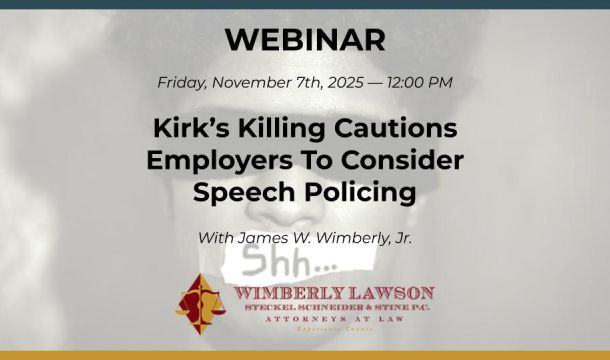Do Your Work Rules Violate the National Labor Relations Act?
The current National Labor Relations Board has been targeting work rules that it finds to be too ambiguous or "sufficiently imprecise" as violations of Section 8(a)(1) of the National Labor Relations Act (NLRA). A recent example comes in the case of Valley Health System LLC d/b/a Spring Valley Hospital, 28-CA-123611 and 28-CA-127147; 363 NLRB No. 178 (May 5, 2016). In that case, the Board reversed the Administrative Law Judge and found that the Respondent/Employers violated Section 8(a)(1) by maintaining a work rule that, among other things, prohibited employees from engaging in "conduct that . . . is offensive to . . . fellow employees." In its decision, the Board noted that the word "offensive" did not give employees sufficient notice of what kinds of conduct would violate the rule:
[T]he broad prohibition against conduct "offensive" to coworkers stands in relative isolation. "Offensive" does not appear among a list of serious forms of objectively clear misconduct that would help employees understand its contours. It is not accompanied by any other descriptive language that would help employees interpret what types of "offensive" conduct the rule is targeting. As previously explained, employees "should not have to decide at their own peril what [conduct] is . . . subject to such a prohibition." Hyundai America Shipping Agency, 357 NLRB 860, 871 (2011), enfd. in part and reversed in part, 805 F.3d 309 (D.C. Cir. 2015). Yet this is precisely the situation the Respondents' rule places employees in.
The Board also noted that the rule at issue is similar to other work rules that the Board has found to be unlawful:
- First Transit, Inc., 360 NLRB No. 72, slip op. at 3 (2014) (finding rule prohibiting "inappropriate attitude or behavior . . . to other employees" unlawful due to its "patent ambiguity");
- Casino San Pablo, 361 NLRB No. 148, slip op. at 3 (2014) (finding rule prohibiting "insubordination or other disrespectful conduct" unlawful as phrase "disrespectful conduct" so ambiguous that employees would reasonably read the rule as encompassing Section 7 activity);
- 2 Sisters Food Group, 357 NLRB 1816, 1817 (2011) (finding rule subjecting employees to discipline for "inability or unwillingness to work harmoniously with other employees" unlawful as phrase "work harmoniously" was "sufficiently imprecise" that it could encompass any disagreement or conflict among employees, including interactions protected by Section 7).
This decision illustrates the tension between an employer's desire to craft its work rules in a way to give it the ability to discipline bad behavior by employees and the current Board's expansive interpretation of Section 7 rights. As a practical matter, an employer cannot possibly list each and every specific behavior that it considers to be "offensive;" any experienced human resources or labor relations professional knows that some employees will always find new and different ways to be offensive at work. However, employers are warned that the current Board takes a dim view of work rules that it considers to be so broa

Kathleen J. Jennings is a former principal in the Atlanta office of Wimberly, Lawson, Steckel, Schneider, & Stine, P.C. She defends employers in employment matters, such as sexual harassment, discrimination, Wage and Hour, OSHA, restrictive covenants, and other employment litigation and provides training and counseling to employers in employment matters.
Related Content
Get Email Updates
Recent Content

TPS Update (as of 2/6/2026)

Job Interviews Can Be a Good Selection Device

Suggestions on How to Diffuse a Tense Situation

Employers Blame Unions for Recent Shutdowns

$27 Million Verdict against Employer on Disability Discrimination over Refusal to Return Employee to Work



